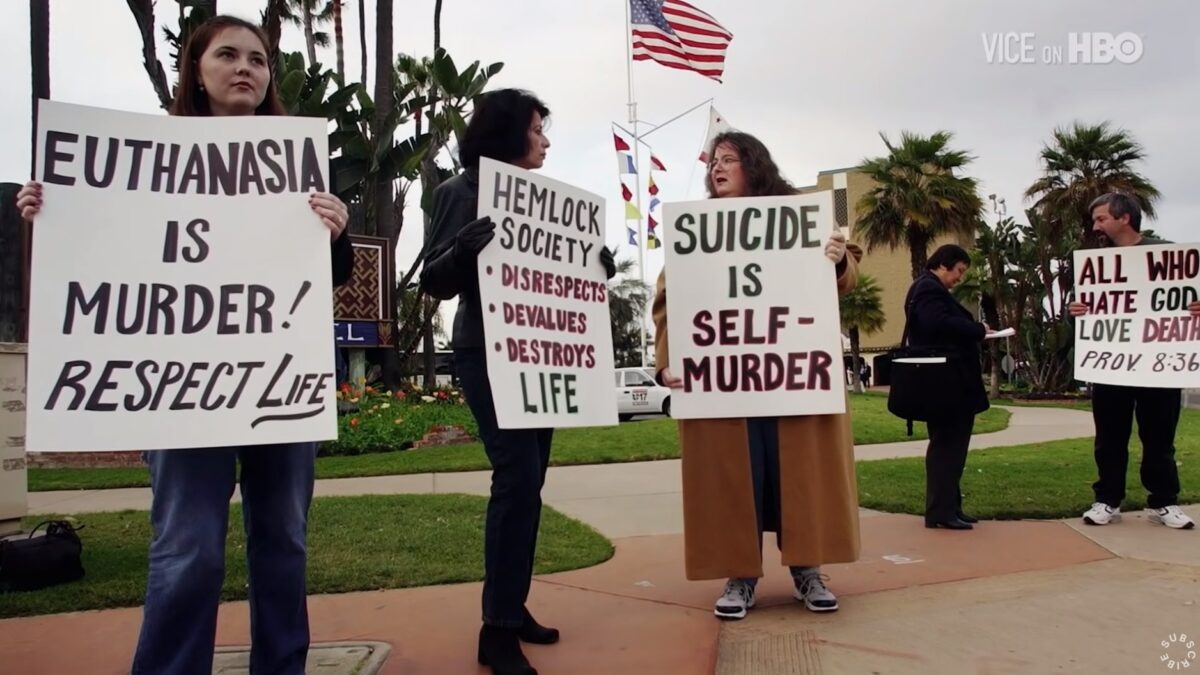News surfaced earlier this month about the Canadian health care system’s planned expansion of medically assisted suicide and the shockingly low bar required for administering such procedures.
Soon, Canadians will be able to request permanent release if they are suffering from something as commonplace as “mental health issues.”
As medically assisted suicide becomes increasingly popular and easier to access, while rates of substance use, overdose, and depression also increase, people are turning to assisted suicide to escape their pain.
Despair has increasingly come to characterize Western civilization, and more and more people are seeking release. The widespread insistence on escaping pain regardless of the consequences, instead of learning to live with it and thriving despite it, presents an existential crisis for the West.
How can a civilization remain, let alone thrive, if it tacitly encourages people to opt out of life when faced with hardship?
Canada’s Death Cult
In 2019, Alan Nichols, a 61-year-old man, was hospitalized in Canada due to mental health problems and concerns that he might be suicidal. The Associated Press reported that within a month of his hospitalization, Nichols requested and subsequently received medically assisted suicide. He wanted to die because he was experiencing “hearing loss.”
According to Canadian law, someone can receive medically assisted suicide only if they understand that the process results in the irreversible condition of death and are experiencing chronic, unbearable physical pain that other treatment methods will not alleviate.
The law requires that someone seeking to receive medically assisted suicide must be in unbearable pain and understand that they are requesting to be put to death. Nichols’ family claims that at the time of his request, he neither understood the process nor was suffering unbearably, but, despite this, the hospital’s staff helped him request euthanasia.
So accessible is assisted suicide in Canada that disabled people choose to be put down instead of living with their disabilities. Assisted suicide has become so prevalent among the disabled in Canada that even the United Nations raised concerns about its availability.
A 2021 memo from the Special Rapporteurs on extreme poverty and human rights and the rights of persons with disabilities along with the Independent Expert on the enjoyment of all human rights by older persons stated:
“It is not beyond possibility that, if offered an expanded right [to medically assisted suicide], persons with disabilities may decide to end their lives because of broader social factors, including loneliness, social isolation and lack of access to quality support services. Indeed, persons with disabilities, particularly older persons with disabilities, may be vulnerable to explicit or implicit pressures arising from their context, including expectations from family members, financial pressures, cultural messages.”
Canada is expected to expand access to assisted suicide in 2023 to include access for children, but currently, it is available to Canadians who are 18 and older who can prove they are suffering from severe pain, including mental anguish.
In Canada, as of 2021, nearly 30,000 people have died through assisted suicide. Despite being legal for less than a decade, it has reportedly become one of the country’s most common ways to die.
And considering that this service is currently available to disabled people “whose deaths are not reasonably foreseeable” and is set to become available to young people whose brains are not fully developed and people generally suffering from mental health issues, one can reasonably conclude that the number of people requesting and receiving assisted suicide will only increase.
In its pursuit of creating a society free of human suffering, Canada’s solution is simple: kill the miserable.
Embracing Decay
Western civilization is in a state of lethargic malaise. Marriage rates and population growth are decreasing rapidly while obesity, recreational substance use, overdose, and instances of major depressive episodes are increasing.
There are few better analogs for the state of Western dissatisfaction and widespread personal anguish than the seemingly ever-increasing number of people who die from “despair.” Many people who seek cathartic relief frequently lose their lives to their vices of choice.
In 2021, for instance, fentanyl — a synthetic opioid often found in trace amounts of popular recreational drugs such as cocaine and marijuana — became the leading cause of death for American citizens aged 18 to 45.
These issues remain largely unaddressed as self-destructive tendencies and trends spiral out of control. And they prompt an important question: If a life is characterized by misery, physical pain, mental anguish, etcetera, ought it continue?
Is the solution to misery simply calling it quits?
It is common sense that if someone is experiencing anguish, they will seek escape from it. So it should come as no surprise that when given the option to permanently end current and any potential future suffering through medically assisted suicide, people take advantage of the opportunity.
In the Netherlands, for instance, there has been a sharp increase in people seeking medically assisted suicide for causes associated with mental illness in recent years. There was even a young woman in her 20s who sought — and received — medically assisted suicide because she was suffering from allegedly “incurable” PTSD stemming from sexual abuse.
At the time of this writing, the average lifespan in the Netherlands is nearly 83. This woman was allowed to end her life, in her 20s, because of mental illness. Surely, her suffering was immense, but she was given the option to terminate her life based on the professionally determined assumption that it would never get better.
People can currently receive medically assisted suicide in several European countries including, but not limited to, Austria, Belgium, Canada, Germany, Spain, and Switzerland, and in multiple American states, including Colorado, Hawaii, Oregon, Washington, New Jersey, New Mexico, Maine, Vermont, Montana, and the District of Columbia.
As access to medically assisted suicide continues to expand throughout the West, allowing more people to kill themselves for more reasons, is it more or less likely that members of Gen Z — who have been the guinea pigs of social scientists and are overwhelmingly depressed — will seek to receive it?
The human experience can neither be defined solely by economic nor cultural trends, but the Western experience is clearly reeling due to the intersection of both. As economic prosperity generally provides us with whatever material goods we want, our culture continues to decay amid widespread decadence.
Resisting Decay
Every civilization, up to this point, came into existence through human beings coming together to resist forces attempting to annihilate them. People joined themselves to other people because it was preferable to survive hardship than die.
Something has gone wrong; the collective human instinct for self-preservation is waning. In the 21st century, when people in the developed world have every reason — ample resources, abundant opportunity, and more — to continue living and resist hardship, they increasingly choose to die when presented with the option.
It has become clear that material abundance, by itself, does not make life worth living. Without a healthy culture to participate in, people become aimless and listless. Furthermore, if Western culture no longer enshrines, let alone emphasizes, the importance of human life and makes it easier to opt out, why ought someone continue living?
If someone has no basis for understanding human existence other than consumption and comfort, choosing suicide seems logical when faced with long-lasting hardship. It is unlikely that these trends will reverse as the West’s malaise persists. It has even been exacerbated in recent years in response to Covid lockdowns.
A rediscovery of the importance of human life is required to reverse course. Only through reasserting in Western culture that human life is sacred can we again understand its importance.
We cannot reasonably expect people to persist if their only reason for doing so is the accumulation of trinkets.








